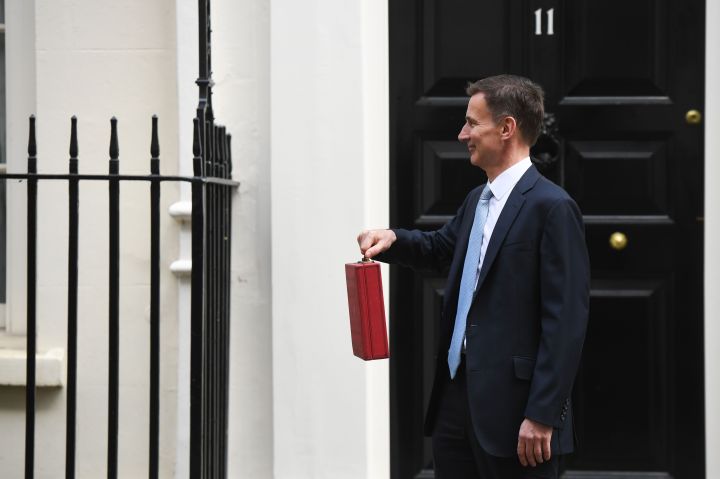Newsdeck
End of UK’s Non-Dom Tax Break Unsettles Wealthiest Residents

The UK is overhauling its system of preferential tax treatment for wealthy foreigners, creating revenue for the government to spend on British voters at the expense of agitating some of the nation’s richest residents.
“After looking at the issue over many months, I have concluded that we can indeed introduce a system which is both fairer and remains competitive with other countries,” Hunt said in the House of Commons. He said the grace period for new arrivals was “a more generous regime than at present and one of the most attractive offers in Europe.”
The changes are intended to raise £2.7 billion ($3.4 billion) in tax per year by 2028-29, in addition to the £8.5 billion that non-doms currently pay in various UK taxes each year. This has given Hunt some extra headroom to cut national insurance, a form of payroll tax, while still meeting his budget targets ahead of a general election that must be called by next January. Labour has also pledged to overhaul the non-dom rules.
The latest reforms “have only added urgency” to wealthy residents looking to leave the UK, according to David Lesperance, a Poland-based tax and immigration adviser for the ultra-rich. “They already knew that a future Labour government was either going to abolish or significantly restrict the remittance basis. Now they know that rather than saving them, the Tories are also willing to throw them under the bus!”
Reform Plan
The changes announced by Hunt include:
- Everyone will pay UK tax on their foreign income and gains after living in the country for four years — scrapping the “remittance basis” rule that only taxes money brought into the UK;
- New arrivals will benefit from 100% UK tax relief on foreign income and gains for their first four years;
- A temporary 50% cut in the personal foreign income subject to tax in 2025-26 for non-doms who will lose access to the remittance basis;
- A temporary repatriation facility, allowing non-doms to bring previously-earned foreign income and gains into the UK at a tax rate of 12% for two years until April 2027;
- Inheritance tax will also move to a residence-based regime, with the details yet to be confirmed.
Mark Davies, a tax adviser for the super-wealthy, said the rule changes “most certainly will mean people will leave. It will actually mean people will not come in the first place as four years isn’t enough to settle with kids.”
“It will appeal to people on secondment to work in the City of London but won’t appeal to billionaires,” Davies added.
Non-domiciled residents — ranging from multibillionaires to middle-ranking bankers — don’t pay UK taxes on their overseas earnings for as long as 15 years under the current program, introduced by the ruling Conservative Party.
More than one in five bankers earning more than £125,000 claimed non-dom status at some point, according to 2022 research from the London School of Economics and the University of Warwick.
But it’s not just the financiers who will be affected: the oil and car industries also have a high percentages of non-dom claimants. And the Premier League has about 370 players with non-dom status, according to Douglas McWilliams of the Centre for Economics and Business Research.
Previously, McWilliams had predicted that around 50 to 80 footballers might consider leaving England if the rules were changed, but he thinks fewer will shift under the government’s plan unveiled on Wednesday. “I’m not convinced there’s a large impact from what they have done and in reality I don’t think they will be able to live with a cliff-edge at four years,” he added.
Read More: What Is UK ‘Non-Dom’ Status? Why Is It Controversial?
There were 68,800 non-doms in the tax year ending 2022. This population has almost halved since 2015, when then-Labour party leader Ed Miliband pledged to scrap the status. A Conservative-led government subsequently announced a measure taking effect from April 2017 to stop non-doms claiming the tax status on a permanent basis, while fees were introduced for longer-term residents.
The UK’s non-dom regime dates back to 1799, when it was introduced to protect colonial investments. In recent years, notable non-doms have included former HSBC Holdings Plc Chief Executive Officer Stuart Gulliver and onetime Conservative Party Deputy Chairman Michael Ashcroft.
Prime Minister Rishi Sunak’s wife, Akshata Murty, was also revealed in 2022 to benefit from the status. After a media storm, Murty said she would pay UK taxes on her global earnings, partly derived from Indian software giant Infosys Ltd.
Other international hubs are competing for wealthy, mobile residents. Italy’s tax breaks have included an option to pay a €100,000 ($108,020) flat levy on income earned abroad, or to pay no taxes on as much as 70% of income. “The concern is that the UK’s loss will be Italy’s gain,” Dominic Lawrance, a London-based partner at global law firm Charles Russell Speechlys, said before the latest changes were announced.
Elsewhere, low-tax regimes have helped to attract financial firms to Gulf cities including Dubai and Abu Dhabi. And Jim Ratcliffe, the 71-year-old founder of chemicals conglomerate Ineos and one of Britain’s richest men, relocated to Monaco several years ago.
“We could see some wealthy individuals shun the UK as a home altogether and take their money with them,” said Sean Cockburn, director at accountancy firm Mazars, of the latest changes. “It’s a careful balancing act that must be struck. Making the UK an attractive place for the world’s wealthy to reside, spend money, and do business while being taxed fairly.”
Chris Hayward, policy chairman of the City of London Corporation that governs the capital’s financial district, said it was “appropriate” to modernize the non-dom rules. “We need to ensure that the changes are positive and proportionate, sending the right signal that the UK is a great place to live and invest.”




















Comments - Please login in order to comment.